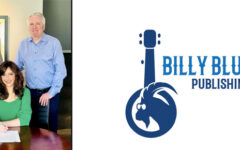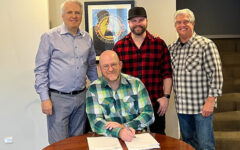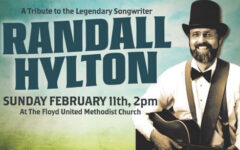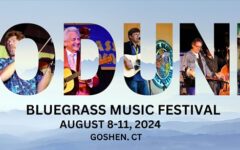This post is part of our occasional feature, Songwriter Profiles. If you have a suggestion for a bluegrass songwriter we might want to consider, please contact us.
 Mark Brinkman has been around music all his life. He grew up in Wisconsin playing classical piano at the age of four. Like so many kids of the 1960s he was heavily influenced by the folk and rock groups of the era. He took up guitar and played everything from Kingston Trio stuff to Doobie Brothers to Jethro Tull. Brink could never have prepared for the change his life would take in 1974 when he attended Bill Monroe’s Bluegrass Festival at Bean Blossom Indiana. It was there he heard groups such at Bill Monroe & the Blue Grass Boys, Lester Flatt & the Nashville Grass, Jimmy Martin among others. It was a life changing experience that continues to influence him today as he continues to write bluegrass, Americana, country and Acoustic songs.
Mark Brinkman has been around music all his life. He grew up in Wisconsin playing classical piano at the age of four. Like so many kids of the 1960s he was heavily influenced by the folk and rock groups of the era. He took up guitar and played everything from Kingston Trio stuff to Doobie Brothers to Jethro Tull. Brink could never have prepared for the change his life would take in 1974 when he attended Bill Monroe’s Bluegrass Festival at Bean Blossom Indiana. It was there he heard groups such at Bill Monroe & the Blue Grass Boys, Lester Flatt & the Nashville Grass, Jimmy Martin among others. It was a life changing experience that continues to influence him today as he continues to write bluegrass, Americana, country and Acoustic songs.
About the same time “Brink,” as all his friends call him, began writing songs, folks songs for acoustic guitar mainly. He performed these songs at many local clubs around Madison, Wisconsin, while attending college there. Over the following 25 and more years he has continued to write music and perform around the country.
He spent a few fruitless years in Nashville, going from publisher to publisher, trying to get his songs published. Discouraged, he gave up song writing for about 10 years.
Bluestone Mountain was the first Brinkman song to be recorded, cut by Don Rigsby and released on his acclaimed Empty Old Mailbox album, released in 2000. Rigsby’s version of this haunting song was awarded the West Virginia Governor’s Award.
Since then Brinkman has not looked back. Going from strength to strength, his songs have been widely recorded. A sample of those that he had had recorded includes She’s a Stranger In His Mind, a song about Alzheimer’s disease recorded by Carrie Hassler & Hard Rain; I Can’t Bear the Thought of Losing You recorded by The Larry Stephenson Band; Prisoner of the Highway, by Don Rigsby & Midnight Call; The Legend of Jonas Willingham recorded by the Lonesome River Band; Alone In The Still Of The Night by Valerie Smith; The Ghost of Silas Jordan, Can’t Be Anything But Love and Hobo’s Lament all by The Boohers; The Old Coal Mine recorded by Larry Sparks; Before Your First Tear Hits the Ground and Tennessee Backroads by Lou Reid & Carolina; When You’re Looking Up by Lorraine Jordan & Carolina Road; and Devil’s Road recorded by Grasstowne.
Brinkman has been a Merlefest Chris Austin Songwriting Contest finalist five times and his song Beyond the Rain was nominated and voted Best Bluegrass Gospel Song at the 2007 National Gospel Quartet Convention in Louisville, Kentucky.
He has his own publishing company, Brinksongs, online at www.brinksongs.com.
Brinkman says, “Writing music is like breathing, something I just have to do to live. I can’t see ever getting away from the process of creating music from a blank page.”
Were you born into a musical family?
We always had music in the house growing up in Wisconsin. Of course there wasn’t any bluegrass but my Grandfather played “big band” music and even did a short tour with Tommy Dorsey. My Mother sang soprano and played violin in a symphony orchestra. Everyone seemed to sing and hours were spent evenings singing and playing music.
When did you take an interest in music and what were the circumstances?
I started piano lessons at age 4 and continued classical training on piano for the next 17 years. During the mid 60’s I started playing guitar and singing folk music. People like The Kingston Trio, Chad Mitchell Trio, Peter Paul & Mary, etc influenced my singing and playing and it was then I started to take an interest in writing my own music. I spent the early 70’s working in Glacier National Park and my roommate was from Ashville, NC and he played bluegrass and knew Doc Watson tunes note for note. I was hooked. I then went to Bean Blossom and heard Lester Flatt, Jimmy Martin, Bill Monroe and I was hooked!! There is no cure for this disease!
When did you take an interest in songwriting and what were the circumstances?
In High School I started writing songs. In the 70’s I started writing country songs and my first years in song writing were spent trying to write “commercial” country songs. I realize now that I wasn’t being true to my own heart and was writing what everyone else “thought” I should write and not writing what was in me deep down. Because of that the songs just always seemed to lack “something.” I go back and listen to those old songs and many times cringe as I compromised my writing. About 7 years ago I stepped down from a corporate mid-management position to concentrate heavily on my song writing. Finally, to follow my passion and my dreams of getting a song or two recorded by an artist or band. I made a business plan and committed to following through with my song writing.
Which songwriters did you first become aware of and what were the circumstances?
My first real big time influences were from the 70’s. People like Steve Goodman, John Prine, Dan Fogelburg, Jim Croce. As I was mostly a solo performer it fit me to a T. I ended up opening shows for many of my heroes and actually got to talk to them about music and song writing. Later on as I got into bluegrass I got into writers like Pete Goble, Jake Landers, Bill Monroe, and then later on Carl Jackson, Larry Cordle, Jerry Salley, Harley Allen. I feel very fortunate to have become friends with many of my song writing heroes and they push me to try set the bar higher and higher for my writing. I’ve been fortunate to have some wonderful co-writers as well. Folks like Louisa Branscomb, Mike Evans, Tony Rackley, Dave Maggard, Bill Castle.
Which songwriters have influenced you and in what ways?
I writing with imagery and writing songs that really “touch” your heart. Make you laugh‚Ķmake you cry. People like Jerry Salley, Carl Jackson, Harley Allen, Tom T. and Dixie Hall, all influence me all the time. They push me to continue to write from the heart and not compromise my songs. I try to write the best song I can. I don’t write for one style or genre or one band or artist. I just try and write the very best song I can and then let the chips fall where they may. I’ve been so fortunate to have over 100 “cuts” now of my songs by many of my musical heroes. It is humbling and rewarding at the same time. Every time I hear one of my songs played live or on the radio it always gives me the chill bumps. I don’t care if it is a local band or a major artist‚ĶIt is an honor that musicians would consider choosing and doing a song that I have created. I plan on doing this for the rest of my life.
When did you first begin to take an interest in bluegrass music and why?
I worked out in Glacier National Park in Montana in the 70’s and I had a room mate from Ashville, NC that played a lot of Doc Watson on his guitar. I fell in love with Doc Watson and started to learn many of Doc’s songs on the guitar. I wanted to find out more about bluegrass music and a friend of mine said, “You’ve got to go to Bean Blossom if you like bluegrass music.” So that is what I did. I packed up my Volkswagon Microbus and had a pup tent and a D-28 and camped up on Hippy Hill. I can remember the first band I heard at Bean Blossom was Lester Flatt and the Nashville Grass. Marty Stuart was on the mandolin, but what got me was Kenny Ingram on the banjo. They took off with Rollin’ In My Sweet Baby’s Arms at about warp 30 and my jaw dropped. I was hooked!!!! Since the beginning I’ve loved the pure sound of those wooden boxes. The songs come from way down deep in your gut and it is almost “primal” with me. It was like a disease that has no cure‚Ķ..but you don’t care!!!
I understand that you play several instruments and play(ed) in bands.
I studied classical piano for many years, but picked up guitar at church camp in 8th grade. I played a lot of the old folk music and then while I was working out West I met up with some friends who wanted me to be in a bluegrass band. They didn’t have a banjo picker so I volunteered to learn. I picked up an old Gibson RB-150 and set out to learn every song in the Scruggs “Bible”, I call it. Pretty soon I had a banjo lick that at least didn’t do any damage to the music. I love the banjo and still play quite a bit, but not nearly enough. From being at Bean Blossom I also fell in love with Monroe and his mandolin. I immersed myself in the Monroe style of mandolin and tried to learn every instrumental that Monroe ever wrote. I just love the power and raw emotion that Bill Monroe put into his music. Later on I picked up the bass, a little Dobro, pedal steel’ etc. In my teens I played in rock bands, playing both the organ and electric guitar. I was in a bluegrass band in Wyoming called the Togwotee Mountain Bluegrass Band and more recently played with a central Ohio band called Common Ground and then Ridgeview. These bands made up of some fine pickers, but it was for fun and we never made any recordings.
What was the first song that you had recorded?
I had a song I wrote called Sunrise recorded by a band from Texas named Texas Rose back in the 1970s, but I didn’t know much about song writing or publishing and never did see any money from that recording. My first major bluegrass recording came when Don Rigsby included my song Bluestone Mountain on his award winning Empty Old Mailbox project. I had give a tape of the song to Ryan Holladay’s dad, Mark Holladay, and asked him to pitch it to Don (as they were friends) in exchange for having to pay me for sitting in on mandolin with the Ryan Holladay Band at Milton Harkey’s festival at Advance, NC. It was a barter that turned out pretty good for me. I know I got the better part of that deal.
I understand that you took a break of about 10 years from song writing; why was that?
It was funny. I wanted to write commercial country songs and in the early 1980s I walked the streets of Nashville pitching songs. It was fun but you sure needed thick skin and had to be able to take rejection. But it was a learning experience for me. I realize now that the songs I wrote back then were songs that I “thought” people wanted to hear. I wasn’t writing from the “HEART.” I was NOT being true to myself and my songs just did not sound “genuine.” To me if a song is not “genuine” there is no hope for it. After years of music and pitching I was moving up in the corporate world with a large insurance company and starting a family and something had to “give.” Unfortunately, it was the music. I still picked some here and there but basically put my music away for many years. About 2000 the corporate world was taking a toll on my health, my family and my well being. I made the decision to step down from my corporate upper management job and go back to a first level employee adjusting claims basing out of my home. Now once a gain my time was my own. I had a renewed energy and sense of purpose as I re-energized my love for music and bluegrass/Americana music in general. I began to write again and just writing from the heart. Not caring if I got a “cut” or not, just trying to write the BEST song that I knew how. I’m still passionate about the music, maybe even more so than I’ve ever been!!!! I LOVE IT!!! It is like breathing for me.
Story songs are your forte; which particular story song tells the best story, do you think and why?
I wrote a story song that ended up being a tribute to troops around the world keeping our freedom. It is called With Love from Normandy. It is a story about a person that goes up into their grandma’s attic and finds a cigar box laying on an old army uniform and some old brown army socks. When they open the cigar box they find an letter postmarked Normandy 1944. It is a letter that was from their grandpa, sent the day before he died at Normandy. The chorus is the entire letter. I like this one because it pulls the listener into the story and really hits deep down emotionally. Whenever I play the song I see the tissues come out and sometimes I have a hard time getting through it as well.
Which of your songs gives you most satisfaction and why?
Songs that impact people’s lives give me the most satisfaction. This many times ends up being one of my gospel songs. In particular my song Beyond the Rain continues to touch peoples lives all over the world. Not a week goes by where I don’t get and e-mail or a phone call telling my how the song has helped them through a tough time. How it has given them hope. It has been played at many funerals. One man told me that Beyond the Rain was his Dad’s favorite song. They blew up the words on a poster next to his casket and had the words on a leaflet in the bulletin. He told me they put the words in his hands before they closed the casket. NOW‚Ķ.that still moves me to tears reading his story. There is NO money in the world that could pay me for that kind of comment. It is a feeling inside that I can’t explain. Both joyful, thankful, exciting and humbling all at the same time!!!!
Have any of your songs won an award or topped any chart? If so, which?
Beyond the Rain was #1 on the gospel charts for several months and was voted “Bluegrass Gospel Song of the Year” by Singing News Magazine at the 2007 National Quartet Convention in Louisville, Kentucky. The Old Coal Mine that Larry Sparks recorded got to #3 on the Bluegrass Unlimited Charts. She’s a Stranger In His Mind, recorded by Carrie Hassler & Hard Rain, won the “Spirit Award” when it was voted by fans the “Country Song of the Year” by “Strictly Country Magazine. I’ve been fortunate to have several in the top 10 like Devil’s Road by Grasstowne and Bluestone Mountain by Don Rigsby.
What particularly inspires you to write?
I try to write every day! Listening to great music motivates me to write. Being around other great writers. I love developing an idea and working with it, watching it all come together at the end. With me it is as natural as breathing. I feel I was born to write songs. It is a gift and one that I try not to take for granted. I try to dig deep down and say things that others might be too afraid to say or too hurt to just come out and say how they feel. When they hear a song of mine, maybe they can say‚Ķ”THAT songs says exactly what I’m feeling”, and it is therapeutic in a way. Letters and encouragement from folks around the world keeps me going. Also, my wife, Jan, and my three children are very supportive of my passion. It ain’t always a “picnic” being married to a songwriter.
Which comes first; the melody or the lyrics?
Actually, when I write they tend to both come at the same time. I tend to get more of an “idea” than a “hook.” I sometimes have an entire story in my head and just have to figure out how to tell the entire story in three minutes. Even when you speak a sentence it has a natural melody and meter to it. I try to take that natural meter and melody and let it fall where it will. I try to fit the “feel” of the song around the chords, speed, mood etc. So, I tend to build the lyrics and the melody and my goal is that they fit together like a glove.
What are the secrets to writing a successful bluegrass song?
It has to come from the heart and be genuine!!! Listeners can see right through a song that is not “real.” It has to have something that every listener can relate to. When you sing about a home place you want EACH listener to be seeing THEIR own home place in their head. If you get too detailed you might lose people but if you not detailed enough it won’t paint a picture for people. It is a fine line. When you are writing about someone dying or losing a loved one there are NO words that can do it justice. There is nothing you can say that wraps up the feeling in a situation like that. BUT‚Ķ..what I try to do is “paint a picture” for the listener. It is NOT the words that cause the emotions to come rushing out‚Ķ..IT IS THE PICTURE that you have painted in the listener’s head. It is the “picture” that evokes the emotion‚ĶNOT THE WORDS!!!!!
What has experience taught you about bluegrass song writing?
Experience has taught me that you need to believe in yourself. There are many “nay-sayers,” people willing to critique and cut you down. You have to be able to dig deep into your soul, deeper than most are willing to go to write a great song. Song writing is a craft. Yes you have to have “the gift” but it is also like building a guitar. The first one might be “ok” and then you build 100 guitars and they look really good and sound really good. You look back at your 50th guitar and you thought it was “great” at the time but now you see the flaws in it. You think your 100th guitar is wonderful‚Ķuntil‚Ķdown the road after you built you 500th guitar and now you see the flaws in the 100th guitar. You just keep getting better the more you work at it. When you put a great song together you can feel it. I get the chill bumps right after I write it‚ĶI KNOW it is a good one. Then I have learned to watch people’s reaction to songs. Peoples eyes will tell you everything you need to know whether a song is great or not Song writing has taught me patience‚Ķwell I’m still learning that!!!!
Tell me about The Ghost of Silas Jordan.
The Ghost of Silas Jordan came to me as a story about a man that was wrongfully accused of a murder back probably around the civil war days. It takes place in Tennessee. I took out a map and saw the name of a town, Caney Springs. I liked the sound and flow of those words “Caney Springs.” I noticed on the map it was just south of Franklin, Tennessee. So the story started: “In the hills just south of Franklin and north of Caney Springs‚Ķthat’s where Silas Jordan made his home.” I love the sound of names too. “Silas Jordan” just sounds like a kewl name. It says something about his ethnicity and to me names just have a certain cool sound. I wrote a song that is called The Ballad of Horton Stubbs. I saw the name “Horton Stubbs” painted on a piece of plywood next to the road in Southern Ohio. I have know idea what it was for or who Horton Stubbs is, but I built him a personality and a story.
Anyway, Silas Jordan is wrongfully accused of shooting and killing Becky Taylor. The men don’t wait for justice and they form a posse and go out to Silas’ home. They burn down his home with him in it. When the posse gets back to town they find an anonymous note that tells them they killed the wrong man because “HE” killed Becky. The valley to this day is haunted and if you go into the valley you can feel the heat of a fire on your chest. It is just “Silas Jordan comin’ home.” It was just a matter of finding a way to tell the story and adding a good chorus to bring everything together. I love the spooky aspect which brings the story forward to the present day.
Mark can be contacted through Brinksongs online.







